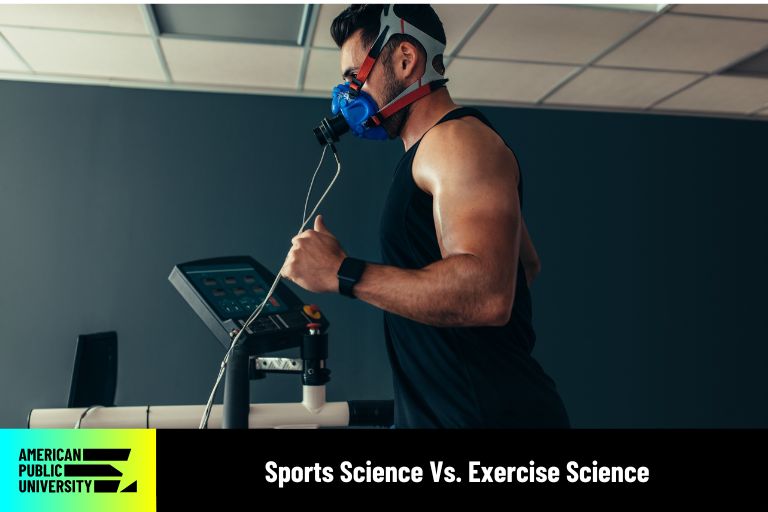01/09/2025

What Is Sports Science?
Sports science is a multidisciplinary field that combines biology, psychology, nutrition and physiology to understand how the human body really performs during a sport and how to improve athletic performance.
Sports science can be applied to professional athletes or individual athletes to develop and help optimize athlete training, mental skills, strength training, injury prevention and recovery. The field also incorporates new technologies and ideas to enhance athletic performance and improve one's overall physical well-being.
Some key areas of sports science include:
- Exercise physiology
- Biomechanics
- Sports psychology
- Sports nutrition
- Injury performance and rehabilitation
- Performance analysis
- Sports medicine
What Is Exercise Science?
Exercise science focuses on the impact of different aspects of physical activity on overall health, fitness and rehabilitation. Exercise science programs work with non-athletes to improve public health and potentially address chronic disease.
Exercise science aims for active individuals to create lasting healthy habits that can be part of everyday life.
Some key areas of exercise science include:
- Exercise physiology
- Health and wellness
- Fitness assessment
- Rehabilitation
- Exercise prescription
Key Differences and Applications
While there is overlap between the two scientific fields, sports science focuses on performance-based and sports-specific elements of human movement, while exercise science focuses more on general health and fitness. Here are some key differences:
Scope
- Sports science focuses on high-performance athletes and high-level sports to optimize athletic performance.
- Exercise science may focus more on general health, fitness and rehabilitation for individuals.
Target Population
- Sports science generally works with athletes or people who train for competitive sports.
- Exercise science generally works with people who want to improve their overall health and well-being or are in rehabilitation.
Applications
- Sport science enhances athletic performance and improve training to prevent injury.
- Exercise science involves promoting healthy habits, disease prevention and rehabilitation education.
Education Journey
If you’re interested in sports and exercise bachelor's degree or master's degree, it may be helpful to earn a degree that provides a foundation in the science of physical activity, mental health, and wellness.
Core Curriculum and Specializations
Sport science academic degree programs may focus more on performance-related subjects and emphasize practical and applied aspects like coaching and sports-specific knowledge. Specializations for athletic trainers may include sports psychology, sports medicine or strength and conditioning.
Courses may include advanced biomechanics, sports physiology, sports psychology, sport performance analysis, injury prevention, physical therapy and rehabilitation, or sports nutrition.
Exercise science programs may focus more on general health and wellness with specific insight into certain populations or their health problems or conditions.
Core courses may include anatomy, physiology, kinesiology or health promotion. A graduate degree may require more specific study or concentration, as students may choose to gain real-world practical experience either by interning or securing part-time employment in gyms, rehabilitation center or within wellness education programs.
The most important thing to consider is career goals and what you’d like to do after graduation. Education and career paths in sports and exercise science are constantly evolving and adapting to new research and technologies.
Choosing a Career Path
Sports and exercise degrees may lead to a wide range of rewarding career opportunities in fields such as coaching sport performance, exercise science degree sports management and healthcare.
Career opportunities in sports, athletic training and exercise science are constantly evolving and adapting to new research and technologies. Sports performance may be a good fit for those interested in sports management, healthcare and learning how to become an athletic director.
Sports scientists may pursue a career in sport science such as:
- Coach or trainer
- Sports psychologist
- Performance analyst
- Strength and conditioning coach
- Exercise physiologist
- Rehabilitation therapist
- Sports nutritionist
Exercise science may be a good fit for students interested in health education, coaching or fitness. Some career options may include:
- Exercise physiologist
- Fitness trainer
- Rehabilitation specialist
- Public health educator
Overlapping Disciplines
As with many similar academic disciplines, sports science and exercise science overlap in areas such as athletic performance, injury prevention and physical health.
Both fields rely on an understanding of the human body and how it moves, adapts and functions under different conditions.
Sports scientists, athletic trainers and exercise physiologists work together to improve athletic performance and overall well-being. In the same vein, athletic trainers and physical therapists also work together to prevent injuries and promote physical health.
Sport Science and Exercise Science: Real-World Applications
Sport science and exercise science are used in real-life situations to improve athlete performance, prevent injuries, and enhance overall well-being. Both fields are not just academic subjects, but have a real impact on people’s lives.
Sport science works with a professional athlete's biomechanics to create training programs that enhance strength, speed or endurance -- like a long-distance runner training for cardio endurance.
Exercise science goes beyond sports to help individuals achieve well-being through health and fitness or rehabilitation. For example, personal trainers may work with someone to come up with an exercise plan to help them achieve their weigh loss goals.
